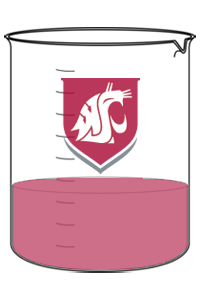Students to use at-home lab kits for online summer chem courses


In order to allow students to complete hands-on lab requirements while transitioned to remote instruction due to COVID-19, Washington State University’s Department of Chemistry will mail lab kits to students taking undergraduate chemistry courses during the Summer 2020 term.
Summer courses that will utilize lab kits include CHEM 101, 102, 105, 106, and 345 through online instruction.
According to Greg Crouch, a clinical professor at the Department of Chemistry and associate chair for undergraduate studies, this is the first time WSU’s Chemistry Department has utilized kits to teach laboratory concepts to students at home.
“Many years ago, we had investigated at-home lab kits for online instruction. But at the time, we didn’t feel they provided a suitable substitute to performing hands-on work in a lab,” said Crouch. “Given the current ‘Stay Home, Stay Healthy’ order in Washington State, we revisited lab kits as an alternative for in-person labs. Today’s kits have increased in sophistication and are able to replicate many of the most essential face-to-face experiments.”
Alongside a mixture of synchronous and asynchronous instruction, the courses will also use lab simulations and other visualization tools to round out the student experience.
“Finding quality kits and other materials was essential, as physical science instruction relies heavily on experimentation to teach essential concepts,” said Crouch.
In order to determine what kits to provide to students, chemistry faculty compared student learning outcomes from existing lab experiments to the experiments possible with kits, attempting to best duplicate the in-person experience. They also worked with WSU Global Campus to help determine ideal kit suppliers.
“Our goal is to replicate the face-to-face experience for our students at home,” said Crouch. “We carefully selected very sophisticated experiments that couple with the course student learning outcomes.”
Before the start of the term, chemistry teaching assistants will film “pre-lab” video lectures, as well as an “unpacking” video, explaining the learning objectives of the lab and providing guidance for conducting lab activities. In order to ensure safety, no hazardous materials will be provided in the kits or used in at-home experiments.
According to Crouch, the Chemistry Department hopes to continue extending distance learning opportunities to students, even after in-person courses begin returning to a campus setting.
“Our fundamental goal is to provide an excellent instructional experience while also providing flexibility for students who may wish to complete some first and second year chemistry courses online, even after the current pandemic recedes,” he said. “I think we are living in a new world, and to remain relevant, we must adapt to the needs of our current and future students. With technology so quickly advancing, we may soon be able to more closely model laboratory exploration, even in upper division courses.”
Preparing for this new form of instruction was a team effort that stretched across the WSU system, said Crouch.
“Chemistry faculty and staff in Vancouver, Tri-Cities, and Pullman have done an extraordinary job preparing for summer instruction using lab kits,” he said. “In particular, Steven ‘Cole’ Mercer, one of our instructional support staff, has been invaluable in working with the lab kit companies to create suitable kits based on course goals.”
Crouch feels that this ongoing effort to adapt to current circumstances is illustrative of WSU’s overall commitment to taking care of its students.
“Ultimately, we want to enable students to stay on track and complete their pre-requisite courses, and in doing, maintain their time to degree. No matter what is going on in the world today, we will do whatever it takes to help our students succeed.”